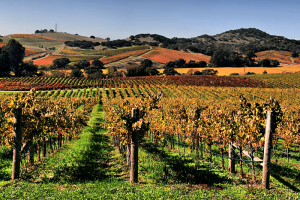
Embark on a journey through Eco-agriculture tourism experiences, where sustainability meets adventure, offering a unique perspective on farming practices and environmental conservation.
Discover how this form of tourism not only benefits the environment but also promotes sustainable living for future generations.
Eco-agriculture Tourism Experiences
Eco-agriculture tourism is a form of sustainable tourism that focuses on promoting agricultural practices that are environmentally friendly. It involves visitors engaging in activities that showcase the connection between agriculture, nature, and conservation.
Benefits of Eco-agriculture Tourism for the Environment
Eco-agriculture tourism offers several benefits for the environment:
- Preservation of Biodiversity: By promoting sustainable farming practices, eco-agriculture tourism helps protect and preserve local flora and fauna.
- Reduced Pollution: Eco-agriculture tourism encourages the use of organic farming methods, which minimizes the use of harmful chemicals and reduces pollution of water sources and soil.
- Carbon Sequestration: Practices such as agroforestry and crop rotation in eco-agriculture tourism contribute to carbon sequestration, helping combat climate change.
Promotion of Sustainable Practices in Eco-agriculture Tourism
Eco-agriculture tourism plays a crucial role in promoting sustainable practices by:
- Education and Awareness: Visitors are educated about the importance of sustainable agriculture and are made aware of the impact of their food choices on the environment.
- Supporting Local Communities: Eco-agriculture tourism contributes to the economic development of rural communities by providing opportunities for local farmers to showcase their products and traditional farming methods.
- Conservation of Natural Resources: By integrating conservation practices into agricultural activities, eco-agriculture tourism ensures the long-term viability of natural resources for future generations.
Spiritual Journeys
Embarking on a spiritual journey can be a transformative experience, offering individuals the opportunity to connect with their inner selves and the world around them in a deeper and more meaningful way.
Destinations for Spiritual Retreats
There are several destinations around the world known for their spiritual retreats, where individuals can immerse themselves in practices such as meditation, yoga, and mindfulness. Some examples include:
- Sedona, Arizona, USA: Known for its vortex sites and stunning red rock formations, Sedona is a popular destination for those seeking spiritual renewal.
- Rishikesh, India: Located in the foothills of the Himalayas, Rishikesh is considered the yoga capital of the world and offers a serene environment for spiritual growth.
- Machu Picchu, Peru: The ancient Incan city of Machu Picchu is not only a marvel of architecture but also a place of spiritual significance for many visitors.
Impact on Personal Well-being
Spiritual journeys can have a profound impact on personal well-being, helping individuals to gain clarity, find inner peace, and develop a greater sense of purpose in life. By disconnecting from the distractions of everyday life and immersing themselves in a spiritually enriching environment, people often return from these journeys feeling rejuvenated and inspired.
Remote Destinations
Remote destinations are defined as places that are far removed from urban centers or major tourist hubs, often requiring a significant amount of travel time and effort to reach.
The appeal of traveling to remote locations lies in the opportunity to disconnect from the hustle and bustle of everyday life, immerse oneself in nature, and experience a sense of solitude and tranquility that is hard to find in more populated areas. Remote destinations often offer untouched natural beauty, unique cultural experiences, and a chance to explore off-the-beaten-path landscapes.
Challenges and Rewards of Visiting Remote Destinations
- Challenges:
- Limited infrastructure and amenities, making travel more difficult and requiring careful planning.
- Potential language barriers and cultural differences that may present communication challenges.
- Remote locations can be more susceptible to extreme weather conditions, natural disasters, and other environmental hazards.
- Rewards:
- A sense of adventure and exploration, discovering hidden gems and pristine landscapes.
- A chance to connect with local communities and learn about traditional ways of life.
- Opportunities for unique wildlife encounters and immersive nature experiences.
Theme Park Vacations
Theme park vacations have become increasingly popular over the years, attracting millions of visitors from around the world seeking thrilling rides, entertainment, and unique experiences. These destinations offer a wide range of attractions, from roller coasters and water parks to live shows and themed areas, catering to visitors of all ages and interests.
Types of Theme Parks
- Amusement Parks: These parks focus on thrill rides, roller coasters, and other adrenaline-inducing attractions.
- Water Parks: Water parks feature slides, wave pools, lazy rivers, and other water-based activities for guests to enjoy.
- Themed Parks: Themed parks are designed around a specific theme or intellectual property, such as movies, TV shows, or fairy tales.
- Adventure Parks: Adventure parks offer outdoor activities like zip lines, ropes courses, and rock climbing for an adventurous experience.
Evolution of Theme Park Experiences
- Interactive Experiences: Theme parks have incorporated interactive elements such as virtual reality rides and augmented reality games to engage visitors in new ways.
- Themed Lands: Parks have expanded to include themed lands based on popular franchises, allowing guests to immerse themselves in their favorite worlds.
- Technology Integration: Theme parks have integrated technology like mobile apps for queue management, personalized experiences, and interactive maps to enhance visitor experience.
- Eco-friendly Initiatives: Many theme parks are adopting eco-friendly practices like solar panels, water conservation, and recycling programs to reduce their environmental impact.
Private Jet Travel
Private Jet Travel offers a luxurious and exclusive way to travel, providing convenience and comfort to high-end travelers. Let’s explore the unique experience of flying on a private jet and delve into the environmental impact it carries compared to commercial airline travel.
Luxury Travel Experience
- Private jet travel offers personalized services and amenities, catering to the specific needs and preferences of the passengers.
- Passengers enjoy spacious cabins, gourmet dining options, and top-notch entertainment systems, creating a luxurious travel experience.
- Private jets allow for flexible departure times and access to smaller airports, reducing travel time and enhancing convenience.
Environmental Impact
- Private jet travel is known to have a higher carbon footprint compared to commercial airlines due to the smaller number of passengers per flight and less efficient fuel consumption.
- Despite advancements in technology to improve fuel efficiency, private jets still contribute significantly to greenhouse gas emissions and air pollution.
- Offsetting carbon emissions through sustainable practices and investments in renewable energy sources can help mitigate the environmental impact of private jet travel.
Comparison with Commercial Airline Travel
- Commercial airlines carry a larger number of passengers per flight, resulting in a lower carbon footprint per traveler compared to private jets.
- Commercial flights follow set schedules and routes, offering less flexibility but reducing overall fuel consumption and emissions.
- While private jet travel provides exclusivity and personalized services, commercial airlines remain a more sustainable option for mass transportation.
Luxury Train Journeys
Embark on a journey of sophistication and elegance with luxury train travel. The allure of luxury train journeys lies in the opulent amenities, impeccable service, and breathtaking views that passengers are treated to along the way.
Famous Luxury Train Routes and Destinations
Experience the epitome of luxury on famous train routes such as the Venice Simplon-Orient-Express, which takes passengers on a journey through Europe in vintage carriages adorned with plush interiors and gourmet dining.
- The Rocky Mountaineer in Canada offers a scenic ride through the picturesque Rocky Mountains, showcasing stunning landscapes and wildlife.
- The Maharajas’ Express in India allows guests to travel like royalty, exploring cultural landmarks such as the Taj Mahal and Jaipur’s palaces.
- The Blue Train in South Africa provides a luxurious ride through the African savannah, offering a glimpse of wildlife and natural wonders.
History and Cultural Significance of Luxury Train Journeys
Luxury train journeys have a rich history dating back to the golden age of rail travel, when trains were the epitome of luxury and sophistication. These journeys hold cultural significance as they offer a glimpse into a bygone era of glamour and elegance.
Boarding a luxury train is not just a mode of transportation but a step back in time to an era of romance and adventure.
Agricultural Tourism

Agricultural tourism, also known as agri-tourism or farm tourism, involves visiting working farms or agricultural areas for the purpose of experiencing and learning about farming practices, rural lifestyle, and local food production. The main goal of agricultural tourism is to educate visitors about where their food comes from, promote sustainable farming practices, and support local economies.
Types of Agricultural Tourism Experiences
- Farm Stays: Visitors can stay overnight on a working farm, participate in farm activities, and experience rural life firsthand.
- Farm Tours: Guided tours of farms where visitors can learn about different crops, livestock, and agricultural techniques.
- Harvest Festivals: Events celebrating the harvest season with activities like picking fruits and vegetables, tasting local food, and enjoying music and entertainment.
- Farm-to-Table Experiences: Opportunities to dine on fresh, locally sourced food directly from the farm.
Benefits of Connecting Tourists with Farming Practices
- Education: Agricultural tourism provides a hands-on learning experience for visitors to understand the importance of sustainable farming and appreciate the hard work that goes into food production.
- Economic Support: By engaging with local farmers and purchasing farm products, tourists contribute to the economic growth of rural communities and help sustain small-scale agriculture.
- Cultural Exchange: Visitors have the chance to immerse themselves in rural traditions, customs, and local cuisine, fostering a deeper connection to the land and its people.
- Environmental Awareness: Experiencing farming practices up close can raise awareness about environmental issues and the impact of agriculture on ecosystems, encouraging sustainable behavior among tourists.
Cycling Tours
Cycling tours offer a unique way to explore destinations, providing a closer connection to the surroundings compared to other forms of transportation. The experience of cycling through different landscapes and interacting with local communities can be enriching and memorable.
Advantages of Cycling Tours
- Immersive Experience: Cycling allows travelers to engage with the environment on a more personal level, taking in the sights, sounds, and smells of the surroundings.
- Health Benefits: Cycling is a great form of exercise, promoting physical fitness and well-being while exploring new places.
- Sustainable Travel: By opting for cycling tours, travelers reduce their carbon footprint and contribute to environmentally friendly tourism.
- Flexibility: Cycling tours offer the flexibility to stop wherever you please, allowing for spontaneous discoveries and interactions along the way.
Tips for Planning a Successful Cycling Tour
- Choose the Right Destination: Select a destination that offers a variety of cycling routes suitable for your skill level and interests.
- Prepare Proper Gear: Ensure you have the appropriate gear, including a well-maintained bike, helmet, comfortable clothing, and accessories like a repair kit and water bottle.
- Plan Your Route: Research and plan your route in advance, considering factors like terrain, distance, and points of interest along the way.
- Stay Safe: Follow traffic rules, wear high-visibility clothing, and be aware of your surroundings to ensure a safe cycling experience.
- Stay Hydrated and Energized: Bring snacks and sufficient water to stay hydrated and energized during your cycling tour.
Health and Environmental Benefits of Cycling Tours
- Physical Fitness: Cycling tours provide an enjoyable way to stay active and improve cardiovascular health.
- Reduced Carbon Emissions: Choosing cycling over motorized transport helps reduce greenhouse gas emissions and supports sustainable travel practices.
- Mental Well-being: Cycling in nature can have a calming effect on the mind, reducing stress and promoting mental well-being.
- Connection with Nature: Cycling allows travelers to connect with nature on a deeper level, fostering appreciation for the environment and wildlife.
Wine and Vineyard Tours
Wine and vineyard tours offer a unique and immersive experience for travelers looking to explore the world of winemaking and viticulture. These tours provide an opportunity to learn about the process of wine production, taste different varieties of wine, and appreciate the beauty of vineyard landscapes.
Appeal of Wine and Vineyard Tours
Embarking on a wine and vineyard tour allows visitors to engage all their senses as they witness the lush vineyards, smell the aroma of fermenting grapes, taste the flavors of various wines, and hear the stories behind each bottle. It is a sensory journey that offers a deeper understanding and appreciation of the winemaking craft.
Cultural Significance of Wine Tourism
- Wine has been an integral part of many cultures throughout history, symbolizing celebration, tradition, and community.
- Wine tourism promotes cultural exchange and appreciation, showcasing the unique flavors and techniques of different regions.
- Visiting vineyards and wineries allows travelers to connect with local traditions and customs, fostering a deeper cultural understanding.
Famous Wine Regions and Unique Offerings
| Wine Region | Unique Offerings |
|---|---|
| Napa Valley, California | Renowned for its Cabernet Sauvignon and Chardonnay, stunning vineyard landscapes, and luxury wine train tours. |
| Bordeaux, France | Home to prestigious wineries producing world-class red blends, historic châteaux, and picturesque vineyard vistas. |
| Tuscany, Italy | Famous for Sangiovese-based wines like Chianti, charming hilltop villages, and agriturismo farm stays offering wine tastings. |
Heritage Tourism
Heritage tourism involves visiting historical, cultural, and natural sites to learn about the traditions, customs, and values of a particular region. It plays a crucial role in preserving and promoting the rich heritage of a destination while providing visitors with unique and educational experiences.
Importance of Heritage Tourism
Heritage tourism is essential for maintaining the identity and authenticity of a place, as it helps in conserving historical landmarks, traditional crafts, and intangible cultural heritage. By attracting tourists to these sites, local communities can benefit economically while raising awareness about the significance of their heritage.
- Heritage tourism contributes to sustainable development by preserving historical buildings and traditions, thereby supporting local economies and creating job opportunities.
- It fosters cultural exchange and understanding between visitors and residents, promoting respect for diverse heritage and traditions.
- By showcasing the unique heritage of a destination, heritage tourism helps in building a sense of pride and belonging among the local population.
Preservation of Cultural Heritage through Tourism
Preserving cultural heritage through tourism involves striking a balance between conservation efforts and visitor access. Sustainable tourism practices, such as limiting the number of visitors, implementing education programs, and promoting responsible travel behavior, are crucial in safeguarding heritage sites for future generations.
“Heritage tourism serves as a tool for cultural preservation, ensuring that historical sites and traditions are passed on to future generations intact.”
Destinations Known for Heritage Tourism
Some destinations renowned for their rich heritage tourism experiences include:
|
|
|
City Breaks

City breaks are short vacations typically lasting a few days, focused on exploring and experiencing a city’s culture, attractions, and local cuisine.
They have gained popularity due to their convenience, affordability, and the opportunity to visit multiple destinations in a short amount of time.
Comparison with Longer Vacations
City breaks offer a different travel experience compared to longer vacations. While longer vacations allow for a more relaxed pace and the exploration of a wider area, city breaks are more fast-paced and focused on immersing oneself in the urban environment. They are ideal for those who have limited time but still want to enjoy a quick getaway.
Tips for Maximizing a City Break Trip
- Plan Ahead: Research the city’s top attractions, dining options, and events to make the most of your time.
- Use Public Transportation: Opt for public transportation or walking to explore the city efficiently and save on transportation costs.
- Try Local Cuisine: Experience the city’s culinary scene by trying local dishes and visiting popular eateries.
- Visit Off-Peak Times: Avoid crowds and long lines by visiting popular attractions during off-peak hours.
- Immerse Yourself in Culture: Attend cultural events, visit museums, and interact with locals to get a true sense of the city’s vibe.
Final Conclusion
In conclusion, Eco-agriculture tourism experiences provide a blend of education, adventure, and environmental awareness, making it an enriching and impactful way to explore the world while contributing to a sustainable future.
Query Resolution
What kind of activities can I expect on an Eco-agriculture tourism experience?
You can participate in farm tours, hands-on agricultural activities, eco-friendly accommodation stays, and workshops on sustainable farming practices.
How does Eco-agriculture tourism benefit local communities?
It provides economic opportunities for farmers, promotes cultural exchange, and encourages the preservation of traditional farming methods.
Are Eco-agriculture tourism experiences suitable for families with children?
Yes, many eco-farms offer family-friendly activities that are both entertaining and educational for children of all ages.





